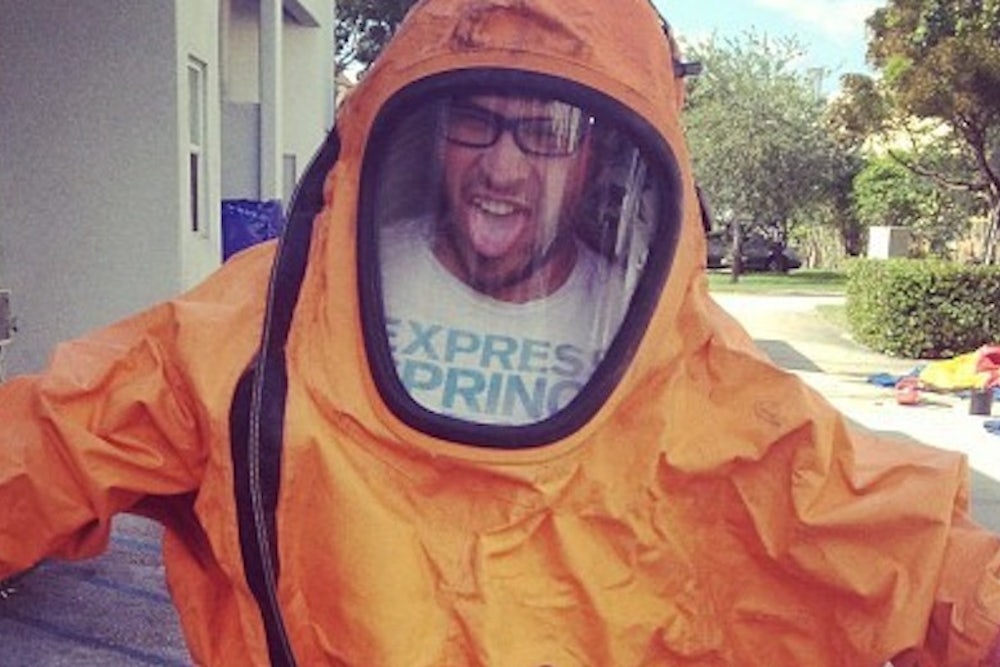There’s no doubt that Alicia Ann Lynch exercised terrible judgment when she decided to dress as a victim of the Boston Marathon bombing for Halloween a mere six months after the tragedy. What’s less clear is that the 22-year-old’s dumb decision was appropriate fodder for national and international media. Lynch incurred the wrath of the Internet, and the consequences were severe, both online and off: She lost her job; a blogger found—and publicized—naked pictures she’d posted to Tumblr under a different name; her family and friends received death threats. A year later, her name still generates over 100,000 results on Google.

Once again, the media has entered everyone with a social media account into a competition for most offensive Halloween costume of the year. There are some solid contenders, including some ill-advised Ebola-themed outfits and Ray Rice costumes, some complete with blackface. MSNBC, Salon and CNN have used Instagram, Twitter, and even Yahoo! Answers to compile lists of the “most offensive” Halloween costumes, and the Huffington Post dedicates an entire page to “Worst Halloween Costumes.”
Random people's tasteless Halloween costumes lend themselves to click-bait and listicles; they invite us to assume the comfortable posture of righteous indignation. But unless you write for The Onion, “Area Man Is an Asshole” is not a story. Millions of Americans dress up for Halloween every year, and isolated examples of tasteless costumes do not reflect any meaningful trend or say much of anything about our culture.
Sure, there are exceptions: If you are a celebrity, it can be argued that an offensive getup is newsworthy or relevant. The editors of US Weekly have pages to fill, after all, and Julianne Hough should have known better than to dress up in blackface. Everyone should know better than to dress up in blackface. And if you’re another kind of public figure—a politician or someone with special status as a representative—public presentation is also loaded. Such people are expected to embody good judgment and sensitivity. Prince Harry’s decision to go to a costume party dressed as a Nazi might make us question his fitness as a leader (of whatever it is he might one day lead).
Many of the costumes deemed “offensive” probably represent misguided attempts at humor or irony, but “random person makes off-color joke” might be even less of a story than “random person is an asshole.” Pretty much as soon as something goes wrong in the world, someone will try to turn it into humor—a phenomenon Joel Warner, author of The Humor Code: A Global Search for What Makes Things Funny calls the “sick joke cycle”: “It's no surprise that we're seeing sick jokes about Ebola, including in the form of offensive Halloween costumes.… By joking about this stuff, people are distancing themselves from the disease and those suffering from it.” But it takes a skilled practitioner to make it work: Sarah Silverman can get away with making jokes about the Holocaust; The Onion won acclaim for devoting an issue to 9/11 two weeks after the attack. Most, however, are likely to offend.

Pointing a finger at the faux pas of a man on the street is journalistic laziness, and representative of a larger trend toward a kind of journalism that is little more than a search for superlatives: “The Most Amazing Video You’ll Ever See …” “The Dumbest Thing a Politician Has Ever Said …” This tendency has obscured the parameters of who’s an appropriate target for derision. It’s not that un-famous people can never be the subject of a headline—but they should have to do something extraordinary for their actions to qualify as news.
This tendency doesn’t just crop up in the weeks leading up to October 31. Trolling college newspapers for tone-deaf editorials and embarrassing photos, for instance, is apparently a legitimate activity for professional journalists. An out-of-touch op-ed by a Princeton freshman attacking the concept of “white privilege” incited a firestorm earlier this year, prompting analysis by writers at The Washington Post, The Atlantic, and The New York Times. Salon claimed that the 20-year-old “speaks for many white Americans.” “There is nothing in the world of journalism more delightful than a stupid opinion piece published in a college newspaper,” writes Hamilton Nolan, introducing Gawker’s 30-million-plus monthly to a student at John Brown University, a small Christian college in Arkansas, who insulted the Hindu gods in a weird indictment of yoga.
And in July, the New York Post featured on its cover Gerry Shalam, an NYU undergraduate who drunkenly bragged to a pedestrian—who was filming the encounter—that his dad “owns half of Manhattan.” Sleuths at the Post discovered that his claims were unfounded; his father, who lives in New Jersey, does not actually “own the cops” of New York City. Shalam’s greatest claim to fame prior to this incident was a turn as the Scarecrow in a community production of The Wizard of Oz. The Post followed up later in the summer to mock the “heir to half of Manhattan” for taking a “lowly” internship with a Brooklyn judge.
But finding examples of everyday inanity is hardly a triumph of investigative journalism. As Simon Waxman wrote in The New Republic: “Today any undergrad with an inflammatory opinion can make a splash, and they may never get dry…. no one should care what they think about weighty issues of public life, yet now they are in the unenviable position of defending their undercooked ideas, not to mention their juvenile prose, before audiences they are not ready to encounter.” Similarly, it’s not that difficult to find some idiotic things being said outside a college bar or boozy brunch spot.
So let’s stop the search for something that’s never been hard to find or all that shocking to begin with. You don’t have to be a defender of cringe-inducing individuals—drunken ramblers, insensitive students, or tasteless party-goers—to realize they’re not worth your time.
